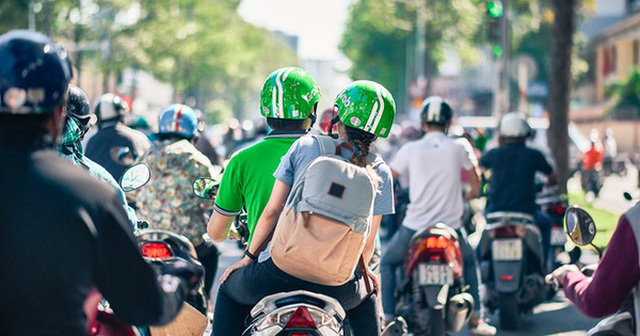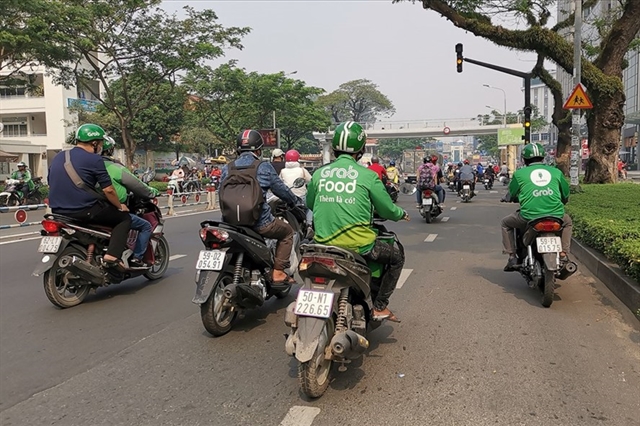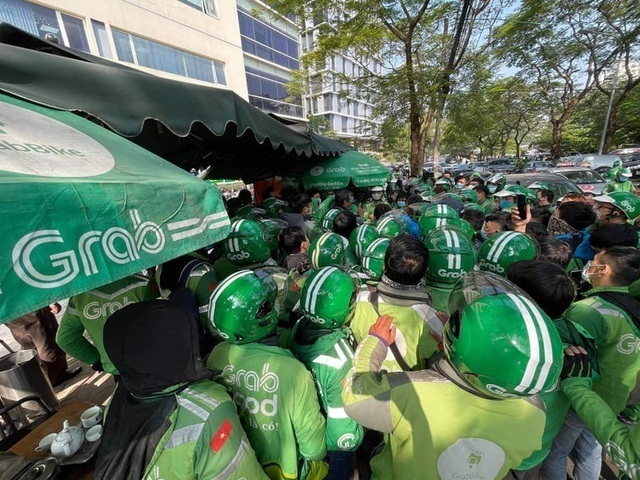As the number of their rides to the airport decreased step by step and stopped completely, Ngo Van Hai, a Grab driver, finally decided to give up the job.

“2020 was a terrible year,” he said.
He had been working as a Grab partner for two years before he quit the job. He mostly received and picked up international travelers at the airport. Ride-hailing was once a good job which brought a stable income after he left a construction company.
However, everything changed because of Covid-19. The sharp fall in the number of clients caused his income to drop by 50 percent. During the social distancing period, the temporary suspension of traditional taxi and e-hailing services pushed most drivers to the wall.
“Sometimes I could not earn any dong during a whole week. I needed money to pay debts,” he said. He decided to sell the car.
Tran Van Hien from Thanh Xuan district said at first he could earn VND20 million as a Grab driver. But the income began decreasing one year later.
As the income was not high enough to pay bank debt, he sold the car at a loss of VND100 million.
Hien affirmed that many other ride-hailing drivers are facing the same problem. They borrowed money from banks to buy cars and now have to sell the cars because the income is too modest.
According to Nguyen Hoai Nhan, a driver from Thai Binh, the income from his job was high enough to feed his family. But now he receives 2-3 orders a day and earns about VND50,000 a day, which is not enough to pay room rent.
“If the pandemic continues, I will have to give up the job,” he said.
Ride-hailing firms are also facing difficulties. Grab’s founder and CEO Anthony Tan said Covid-19 has posed great challenges for the largest ride-hailing startup in Southeast Asia. The firm has had to made difficult decisions on cost cutting and capital management.
| Ride-hailing drivers throughout the year 2020 were hit hard by the effects of the pandemic, which led to a sharp fall in clients at the beginning of the year, and by the new policy on required higher discount rate. |
“Covid-19 is the largest crisis affecting Grab in its history of eight years of operation,” the CEO wrote in a message to investors and partners.
The crisis has had an unprecedented impact on the company’s business and partners.
Ride-hailing firms had to suspend operation as requested during the lockdown earlier this year. Car drivers had to stop working temporarily, while motorbike drivers shifted to delivering goods and providing shopping services to earn a living.
The high unemployment rate explains the rapid increase in the number of ride-hailing drivers. Meanwhile, consumers are tightening their purse strings, which affected drivers’ incomes and led to a high proportion of drivers leaving the market.
Meanwhile, Decision 146 has put an end to the program on the application of technology in managing and connecting electronic contract-based passenger transportation, paving the way for ride-hailing firms extending their services nationwide.
Since April 1, ride-hailing services have been covered by the newly issued Decree 10.
Under the new regulations, traditional taxis and ride-hailing apps have the right to choose either to mount a light box with the word ‘TAXI’ or a reflective light logo instead of the only choice of a light box.
As a new type of business, ride-hailing apps once raised controversy. Traditional taxi firms complained they were unfairly treated and accused ride-hailing apps of evading tax.
In Hanoi, the number of traditional taxis was fixed at 19,000 and they were prohibited to circulate on some streets in rush hours. Meanwhile, ride hailing cars could travel on all streets.
While ride hailing drivers were complaining this year about the sharp fall in number of passengers, they received another blow in the last month of the year: Grab changed the policy on required discount. The firm cited the new policy on VAT by the government in Decree 126.
Grab has several times changed its policy on discount rate since it arrived in Vietnam. With the latest adjustment, the required discount rate has become very high for partner-drivers, which prompted them to go on strike.
The board of directors of Grab had an online dialogue with partners on the implementation of the Decree 126. The dialogue ended with disappointment for drivers as Grab stated the changes in the policy on discount rate would be implemented.
Meanwhile, the General Department of Taxation affirmed that the new decree only guides tax declaration and payment, but it doesn’t change the tax rate.
Nguyen Xuan Thuy from the Ministry of Transport said the sharing economy means mobilizing idle instruments and assets for production and business, thus improving the efficiency of usage of resources.
However, Grab doesn’t just use idle instruments to make money. Agreeing with Thuy, Pham Xuan Hoe from SBV also said Grab is a variation of the sharing economy.
Duy Anh

New tax policy for ride-hailing services sets off storm
Earlier this month the Government’s amendment of tax regulations for ride-hailing services, which increases the tax they actually pay, was a topic of hot debate in the media.

E-hailing drivers disillusioned as income falls
Ride-hailing drivers have seen their incomes fall dramatically because of policy changes.
